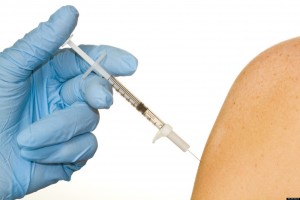 Although immunisation rates are generally good in York (92.3% had their full MMR vaccines – data: NHS England) recent research shows that “letting nature run its course” by allowing childhood infections to build immunity is a poor, and possibly unsafe choice.
Although immunisation rates are generally good in York (92.3% had their full MMR vaccines – data: NHS England) recent research shows that “letting nature run its course” by allowing childhood infections to build immunity is a poor, and possibly unsafe choice.
Recent research has shown that a natural infection by measles in a child has the effect of resetting the immunity of the child back to that of a newborn infant. All the immune memory, which we rely on to protect us, is destroyed. The measles virus kills white blood cells that have a “memory” of past infections and therefore provide immunity to them. It had been thought that these cells bounce back because new ones appear following recovery. However, recent research in monkeys has shown that these new memory cells only remember measles itself.
In other research, a team analysed child mortality records from the UK, America and Denmark before and after the measles vaccination was available. The data showed that the number of children who died of infectious diseases was linked to the number of measles cases there had been in the two or three years previously. The duration of the so called “immune amnesia” is similar to the time it takes for new born babies to build up a natural immunity; this suggests that measles resets children’s immunity to that of a newborn.
City of York Council’s Interim Consultant in Public Health, Dr Sohail Bhatti said: “This research shows the importance of getting our children vaccinated and the implications if we don’t. I would urge parents in York to do the best by their children and ensure they receive the MMR vaccine to protect them against measles, as well as mumps and rubella.
“If children are not vaccinated against measles they run a much higher chance of getting the disease which means their immune memory could be destroyed. They are then more likely to get other diseases when the symptoms and consequences can be much more severe.”
For more information about measles and the MMR vaccine visit www.nhs.uk
